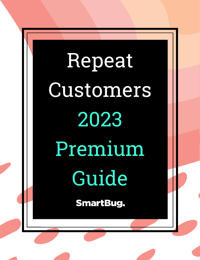
Klaviyo Attribution Reporting: Understand How Your SMS and Email Campaigns Are Performing
January 19, 2023
We’re currently living in an age of abundance when it comes to the data that email service providers share with us, but whether or not your tech stack tells a complete picture is a different story.
We’ve worked with plenty of clients who have transitioned from platforms that provide data information on minor league metrics for email and SMS campaigns—such as click rates and open rates—and witnessed a world of difference as they transition to Klaviyo.
Klaviyo opens up a door of endless data possibilities by allowing the user to dig a bit deeper than these surface-level metrics and helping marketers and business leaders make more informed decisions for these critical marketing channels.
Read on to learn about Klaviyo’s attribution reporting, including key metrics, benchmarks, and examples.
Klaviyo’s Shining Metrics
The beauty of Klaviyo’s attribution reporting is that it gathers much deeper insights into the performance of email and SMS campaigns than your average email service provider (Mailchimp, Flodesk, and others). By measuring specific metrics, the platform provides you with an opportunity to discover and analyze website activity, checkouts started, and revenue that is directly attributable to each message.
In my experience, I’ve found the following metrics to be the most insightful when it comes to measuring performance and creating actionable steps for future campaigns:
1. Revenue Attributed to a Campaign
Is the email or SMS campaign bringing in the big bucks? Then something’s going right. By analyzing the highest-performing messages in the campaigns sent during a specific period of time, you can learn what did and didn’t work for a specific subscriber base. This might include:
- The Content: Was it short and sweet or long and informative?
- The Design: Was it minimalist or showy?
- The Offer: Did you offer a monetary discount or a gift?
2. Placed Order Rate
Also known as the conversion rate, your placed order rate tells you the number of conversions attributed to a campaign divided by the number of recipients.
3. Total Recipients on Any Given Campaign
By measuring the total number of recipient sends, including bounces or failures to deliver, you can investigate issues related to deliverability.
4. Revenue per Recipient
Finally, by measuring average revenue attributed to each recipient, you can learn more about the quality of your email list. In other words, if other performance metrics are high but your revenue per recipient is low, it may be time to fine-tune your segmentation.
Remember: Metrics Don’t Stand Alone
There’s always context behind the greater story of what’s going on with your campaigns. No business is the same, nor are the customer bases.
When looking at your numbers, consider recent or major changes to your business or strategy. For example, did you scale back on ads, leading to fewer people hitting the website, engaging with the pop-up, and getting into your Welcome flow?
Or, another example: If you just looked at the placed order rate for a particular campaign, you might have concerns, but by looking at placed order rate, total number of recipients, and click rate, paired with the awareness that you or your client scaled back on ads, you have a lot more context.
Ready to learn how our e-comm marketers can help you? Get in touch!
Considering Benchmarks and Your Business’s Unique Thumbprint
As you guide your flow and campaign process, it’s important to measure your efforts against Klaviyo’s established benchmarks while understanding that your business has its own unique thumbprint. In other words, have solid numbers to shoot for, but dig into your own analysis to better understand your efforts and goals.
The Magic of A/B Testing
A/B testing is one of the best ways to perform an analysis of your campaign content and better understand your unique subscriber base.
Also known as split testing, A/B testing is a method to test variations of your emails, landing pages, SMS messages, and sign-up forms. Variations are created by making slight changes to the attributes of the test subject.
For instance, you might test one CTA against another or one subject line against another with the goal of increasing open, click, and conversion rates. Although only measuring open and click rates doesn’t tell the entire story, it can be very informative in day-to-day account management.
The Necessity of Segmentation
With thoughtful segmenting and continuously using the “advanced” tab under campaign performance in Klaviyo, you can see specific inboxes—such as Yahoo or Gmail—that need targeted segmenting to help increase open rates.
We’ve seen clients regularly climb into the 40-50 percent open rate territory with a very intentional segmentation strategy.
Segmentation in Action
Here's an example of how segmenting increased the open rate for one of our clients. In this case, Gmail and Hotmail were dragging the email open rate down to 20.5 percent.
By creating a segment to exclude Gmail and Hotmail subscribers who hadn't engaged in the last 30 days, we were able to bump those open rates back up and earn more credibility in those inboxes, which led to fewer emails ending up in spam or the promotions folder.
This process took about a month to ease into the 40 percent range, eventually landing on 42.5 percent. These days, our average for clients across the board hovers around 40 percent.
Dig into Analytics with SmartBug
At SmartBug, our e-commerce team doesn’t just create informative, compelling copy and design—we measure the performance of our efforts to ensure our clients can see a clear line between email and SMS marketing efforts and revenue.
To learn more about how we create and measure the success of our work, including by using Klaviyo’s attribution reporting, check out our premium piece of content, Email Marketing Templates for E-Commerce: Revenue-Driving Email Flows.
%20(1).jpg?width=120&height=120&name=AK_-147%20(1)%20(1).jpg)
About the author
Kelsey Chapman was formerly a multi-passionate marketing wizard who fancies herself as a marketing maven by day, writer by night (true story, she’s a published author). Experienced with industry-leading brands, start-ups, and small businesses, she has developed a passion for taking digital platforms to the next level and turning ideas into revenue-driving campaigns. She has a knack for helping businesses increase their digital footprint with custom strategy and implementation while having a lot of fun at the same time! On any given day, you can find her brainstorming campaign calendars or digging into the data to optimize performance. At this point, she’s probably 98 percent surviving on iced coffee, but that’s neither here nor there. Read more articles by Kelsey Chapman.









